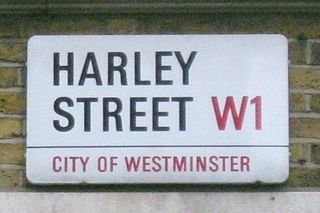
Harley Street is a street in Marylebone, Central London, named after Edward Harley, 2nd Earl of Oxford and Earl Mortimer. Since the 19th century it has housed a large number of private specialists in medicine and surgery.

Alexandra Elizabeth Kingston is an English actress. Active from the early 1980s, Kingston became noted for her television work in both Britain and the US in the 1990s, including her regular role as Dr. Elizabeth Corday in the NBC medical drama ER (1997–2004) and her title role in the ITV miniseries The Fortunes and Misfortunes of Moll Flanders (1996), which earned her a BAFTA nomination for Best Actress.
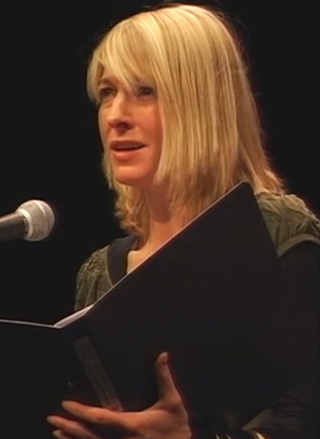
Jemima Rebecca "Jemma" Redgrave is a British actress, and a member of the Redgrave family. She played the title character in four series of Bramwell, and has a recurring role in Doctor Who as Kate Stewart, Head of Scientific Research and Commander-in-Chief at UNIT. As well as a career in television, she has appeared in many stage productions and on film, including her portrayal of Evie Wilcox in the Merchant Ivory film Howards End.
Peita Margaret Toppano known as Peta Toppano is a British-born Australian actress, singer and dancer. She is most widely known for her roles in The Young Doctors as Dr. Gail Henderson, Prisoner, as Karen Travers, Return to Eden as Jilly Stewart, and in Home and Away as Helen Poulos.
Sylvana Palma Windsor, Countess of St Andrews is a Canadian-born academic and historian. By virtue of marriage she is a member of the House of Windsor and is related to the British royal family as the wife of George Windsor, Earl of St Andrews, eldest son of Prince Edward, Duke of Kent, second cousin of King Charles III.

Dulcie Winifred Catherine Savage Denison,, known professionally as Dulcie Gray, was a British actress, mystery writer and lepidopterist.

The Citadel is a 1938 British drama film based on the 1937 novel of the same name by A. J. Cronin. The film was directed by King Vidor and produced by Victor Saville for Metro-Goldwyn-Mayer British at Denham Studios. It stars Robert Donat and Rosalind Russell. The film and book helped the creation of Britain's NHS in 1947.
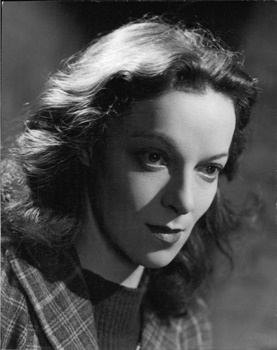
Beatrix Alice Lehmann was a British actress, theatre director, writer and novelist.

Juggernaut is a 1936 British mystery film, starring Boris Karloff and Joan Wyndham. Directed by Henry Edwards, it was based on the novel by Alice Campbell and was distributed by Julius Hagen Productions. It was also known as The Demon Doctor.

Grand Canary is a 1934 American drama film directed by Irving Cummings and starring Warner Baxter, Madge Evans and Marjorie Rambeau. It is an adaptation of A. J. Cronin's 1933 novel of the same title.

La Habanera is a 1937 German romantic melodrama feature film directed by Detlef Sierck. Zarah Leander, who was recently signed by UFA, stars, in the lead role of Astrée Sternhjelm and also performs its title song, "La Habanera". Like many of her films of this era, it proved an enormous box office success.

Doctor in Distress is a 1963 British comedy film directed by Ralph Thomas and starring Dirk Bogarde, James Robertson Justice, and Samantha Eggar. It is the fifth of the seven films in the Doctor series. After a one-film absence, it was the final return to the role of Simon Sparrow by Dirk Bogarde, and also the return of Donald Houston. The film uses some of the characters in Richard Gordon's Doctor novels, but is not based on any of them.

Doctor in Love is a 1960 British comedy film, the fourth of the seven films in the Doctor series, directed by Ralph Thomas and starring James Robertson Justice and Michael Craig. It was the first film in the series not to feature Dirk Bogarde, although he did return for the next film in the series Doctor in Distress. It was loosely based on the 1957 novel of the same title by Richard Gordon.
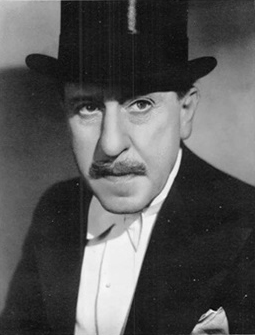
Athole Chalmers Stewart was a British stage and latterly film actor, often in authoritarian or aristocratic roles.

The Passionate Stranger is a 1957 British drama film, directed by Muriel Box and starring Margaret Leighton and Ralph Richardson. It uses the film within a film device, with the "real" part of the plot shot in black-and-white and the "fictional" element in colour.
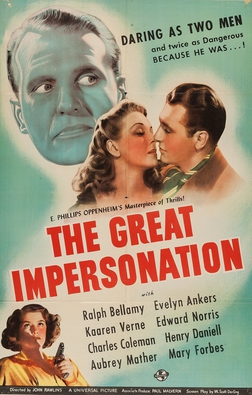
The Great Impersonation is a 1942 American thriller film directed by John Rawlins and starring Ralph Bellamy, Evelyn Ankers and Aubrey Mather. It is an adaptation of the 1920 novel The Great Impersonation by Edward Phillips Oppenheim with the setting moved from the early 1910s of the novel to the Second World War. It was made by Universal Pictures and was a remake of their 1935 film of the same name.
Spy Castle is the 12th novel in the long-running Nick Carter-Killmaster series of spy novels. Carter is a US secret agent, code-named N-3, with the rank of Killmaster. He works for AXE – a secret arm of the US intelligence services.
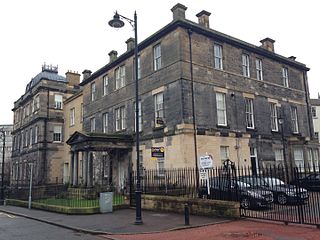
Leith Hospital was situated on Mill Lane in Leith, Edinburgh, and was a general hospital with adult medical and surgical wards, paediatric medical and surgical wards, a casualty department and a wide range of out-patient services. It closed in 1987.

Sylvia Hope Leith-Ross, MBE was an English anthropologist and writer who worked primarily in Nigeria.

The Edinburgh College of Medicine for Women was established by Elsie Inglis and her father John Inglis. Elsie Inglis went on to become a leader in the suffrage movement and found the Scottish Women's Hospital organisation in World War I, but when she jointly founded the college she was still a medical student. Her father, John Inglis, had been a senior civil servant in India, where he had championed the cause of education for women. On his return to Edinburgh he became a supporter of medical education for women and used his influence to help establish the college. The college was founded in 1889 at a time when women were not admitted to university medical schools in the UK.

















